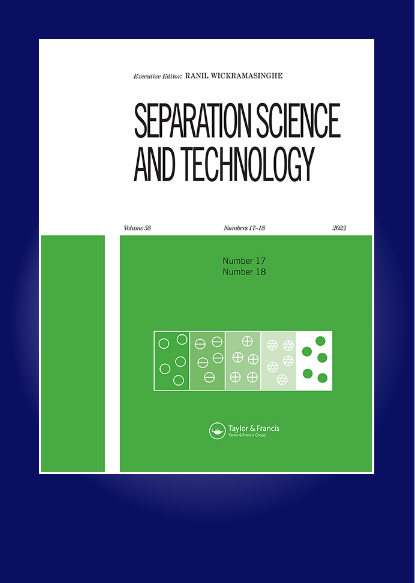Treatment of urban wastewater by coupling planted filters with anodic oxidation process
IF 2.3
4区 工程技术
Q3 CHEMISTRY, MULTIDISCIPLINARY
引用次数: 0
Abstract
ABSTRACT The wastewater reuse strategy has the advantage of providing an effective resource to reduce water deficits, protect natural resources and alleviate future water shortages caused by climate change. In many arid and semi-arid regions, water reuse provides the majority of irrigation water, which is why appropriate treatment techniques are needed. These include planted filters, with restricted reuse of agricultural treated water. The main innovation is therefore to develop a new technique with reduced operating costs and increased efficiency for wastewater treatment that can be used in different sectors (household, industrial, washing centers…). The current work aimed to assess the performance of coupling planted Filters with anodic oxidation on platinum to remove contaminants and pathogens from urban wastewater effluents. To evaluate the efficiency of this hybrid process, urban sewage was first treated by filters planted with reeds, then by anodic oxidation on platinum using photovoltaic panels. Results showed that this treatment system allows a complete elimination of organic matter, ammonium nitrogen, and pathogenic bacteria. Removal rates were ~ 100% for COD, ~100% for BOD, ~100% for NH4 +, 93.24% for NO3 −, and ~100% for TC, FC, and FS. Due to the satisfactory performance, treated water can be reused without restriction in different sectors.植滤与阳极氧化耦合处理城市污水
本文章由计算机程序翻译,如有差异,请以英文原文为准。
求助全文
约1分钟内获得全文
求助全文
来源期刊

Separation Science and Technology
工程技术-工程:化工
CiteScore
6.10
自引率
3.60%
发文量
131
审稿时长
5.7 months
期刊介绍:
This international journal deals with fundamental and applied aspects of separation processes related to a number of fields. A wide range of topics are covered in the journal including adsorption, membranes, extraction, distillation, absorption, centrifugation, crystallization, precipitation, reactive separations, hybrid processes, continuous separations, carbon capture, flocculation and magnetic separations. The journal focuses on state of the art preparative separations and theoretical contributions to the field of separation science. Applications include environmental, energy, water, and biotechnology. The journal does not publish analytical separation papers unless they contain new fundamental contributions to the field of separation science.
 求助内容:
求助内容: 应助结果提醒方式:
应助结果提醒方式:


